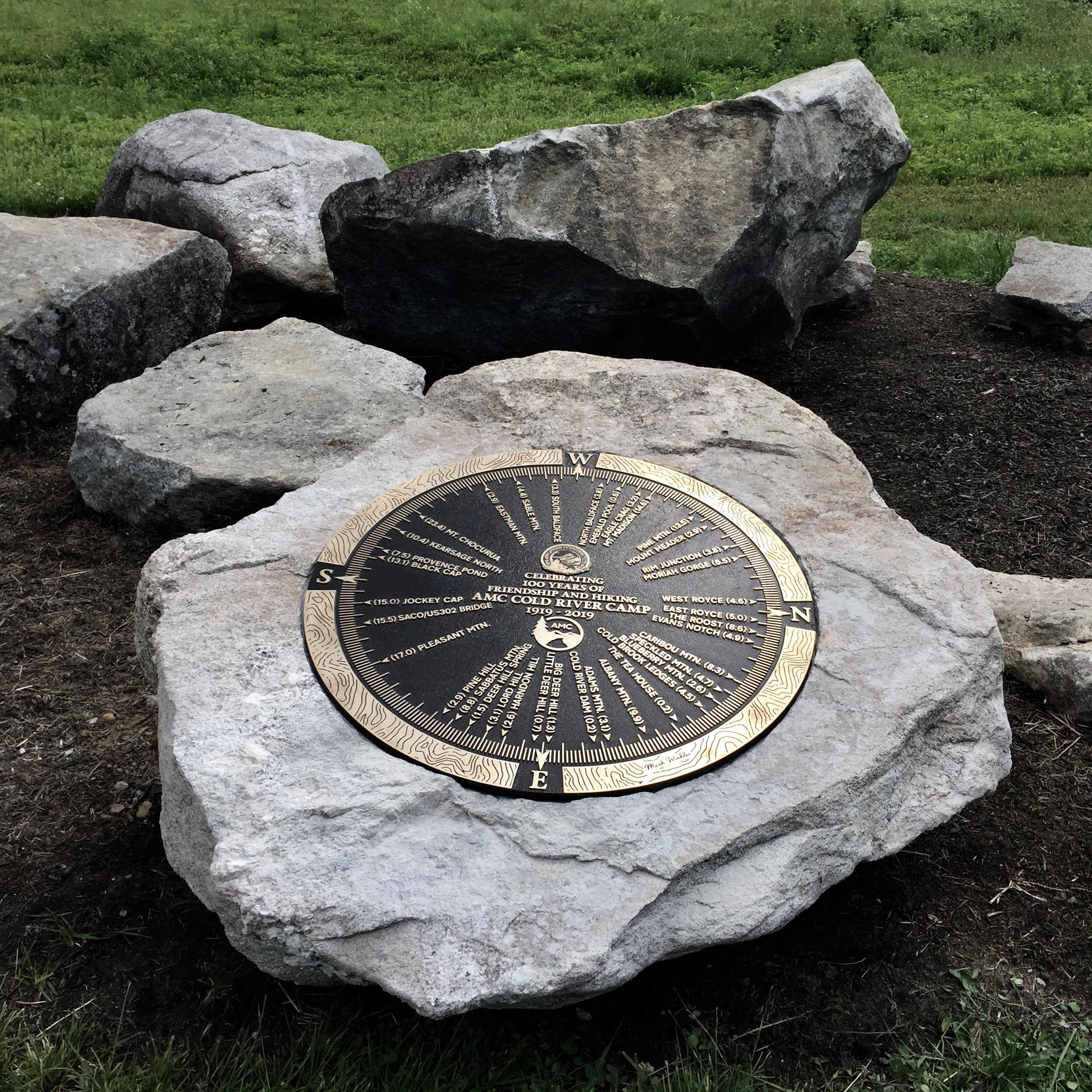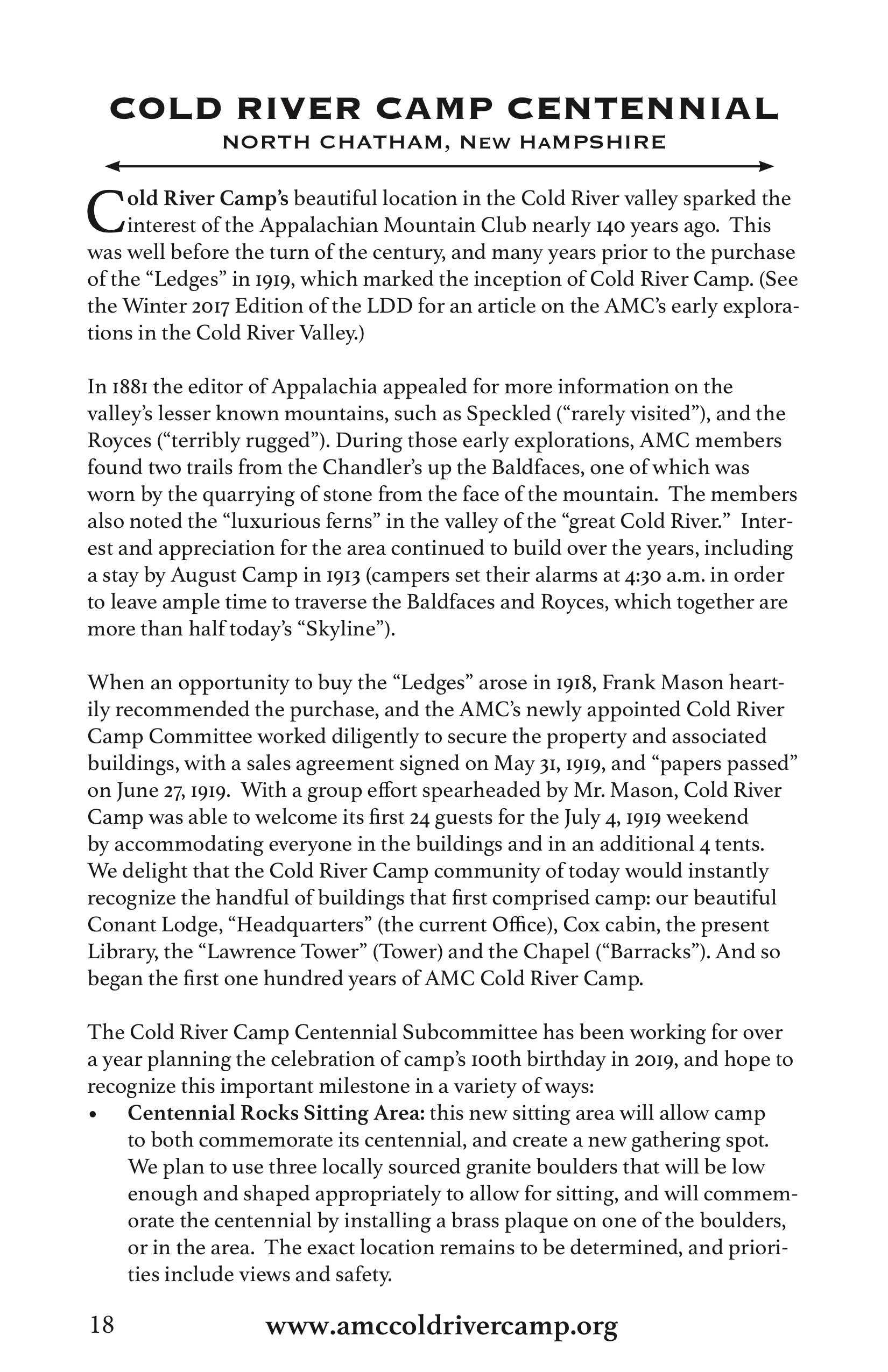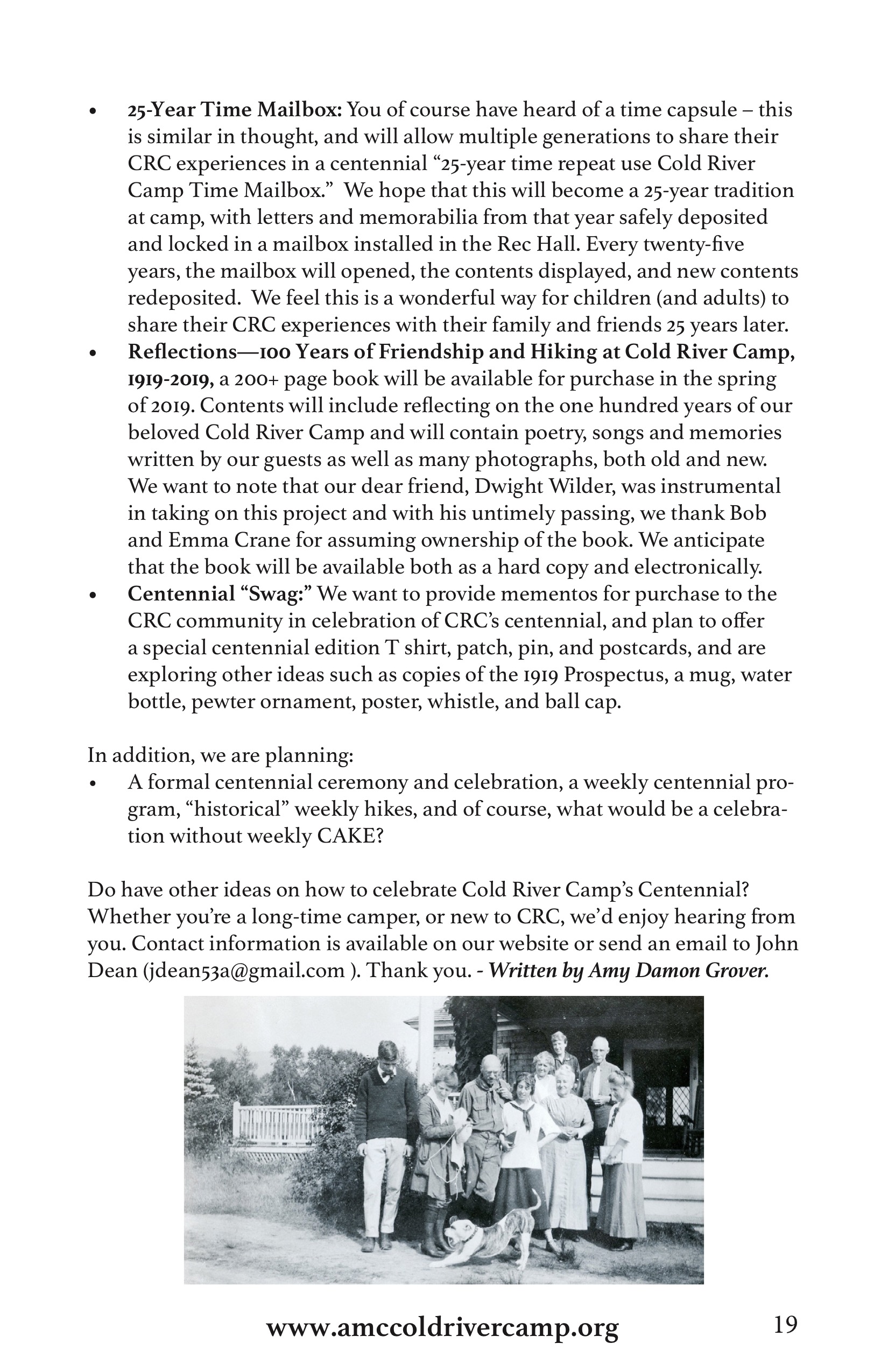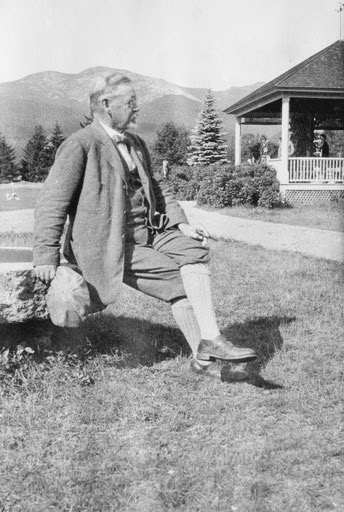CRC 2019 Centennial
Summer 2019 Update:
Cold River Camp celebrates it centennial year in 2019! This historic occasion will be commemorated throughout the summer and extension season. Take time to visit the new Centennial Rocks sitting area in Camp, and read Emma Crane's new retrospective of Camp history, Reflections: 100 Years of Friendship and Hiking at AMC Cold River Camp.

Winter 2018 Update:


Winter 2017: A History of CRC: the Restored 1885 Photo Album
Cold River Camp, in a direct sense, owes its founding to an AMC group who spent a week in North Chatham in 1918. In their rambles about the valley, they discovered a “For Sale” sign at the “Ledges,” the private camp of Rev. Wilford Robbins, an Episcopal clergyman. Recognizing the potential of the site, an ad hoc group was formed to raise funds for its purchase, and to persuade the AMC to acquire it as a Club facility. Their efforts were successful, and in late June 1919 Cold River Camp opened. The first known AMC visit to this area, however, took place much earlier, in 1882, when a group exploring parts of the Wild River watershed from the north dropped down into Cold River Valley, and checked out several attractions, such as Brickett Falls and the Royces. A report of their trip appeared in Appalachia, the AMC journal.
In the fall of 2016, members of the committee planning CRC’s 2019 centennial learned of another early AMC group who stayed in the Valley in 1885, 33 years before the 1918 party. The evidence comes from a photo album donated in 1936 by Richard Manning of Gambier, Ohio, and recently restored by a member of our CRC “family,” Richard Werbin. Thanks to both of these men, we now have an amazing visual record of the area, two decades earlier than even the construction of Robbins’ original camp buildings. Manning was one of a group of perhaps a dozen or more who travelled on their own initiative (not as an official Club outing) to North Chatham in the summer of 1885. They stayed at the farm of Charles Chandler, which still stands, in a much altered and enlarged form, as Deer Hill Farm, the large white house owned by Steve Fink, just south of Camp. Based on surviving picture captions, the group included Ernest Machado and his wife; Machado’s father; his sister Alice and her husband, Theodore Osborne; a Mr. H.B. Goodrich of Middletown, CT; and Manning. The identities and hometowns of others are not known, nor the duration of their stay.
Thanks to Werbin’s restoration, the photographs show a stunning array of scenes and features that are still recognizable over 130 years later, and that provide clues to the visitors’ activities. There are two panoramic views looking north to the Royces. They took photos of a number of waterfalls, including one of one of Rattlesnake Gorge and another unmistakable snap of Emerald Pool, as well as earlier bridges over Chandler Brook and Cold River.
All of these testify to walks they took in the Valley. There is another familiar view, looking west from the summit of South Baldface toward Mount Washington, along with one of the party who made that ascent – six men and one woman (Alice Osborne). We should bear in mind that that outing took place in an era before well-marked, maintained trails. Yet another picture shows a tennis court they set up in a roadside meadow, while others show the Chandler farm and its buildings, and a nearby farm (today’s Baldface Mountain Farm, also known as the Wardwell Farm – then owned by a member of the Chandler clan).
What is quite startling to a modern viewer, though, is just how wide open the valley floor was back then. The foreground (including the future site of CRC) in the photos of the Royces and other mountains reveals broad fields, even more spacious than those in pictures from Camp’s early years. A lack of plowed ground suggests this acreage was used for grazing or hay (or both).
At the front of the album is Manning’s 1936 letter donating the collection. In it, he noted that he had returned to North Chatham in 1935, the fiftieth anniversary of his prior visit, observing, “my memories of the rare loveliness and peacefulness were wholly justified.” How many of us echo those thoughts when we too come back to Camp! - Dwight Wilder
What's your CRC Story?
The Centennial Committee is continuing to plan events and other ways for us to celebrate our 100th birthday in 2019. These include an updated history of CRC. We welcome personal recollections and other memorabilia of Cold River, across the full span of our collective century. Whether you’re a long-term camper or a relative newcomer, we’d like to hear from you. Contact information is available at our website. - John Dean, Chair

Theodore Conant, one of the original architects of the Cold River Camp vision.
Summer 2016: Centennial Planning
Did you know that Cold River Camp will soon reach an important milestone? Almost 100 years ago, Philip Ayers, the President of the AMC, appointed a special committee to look into the possibility of establishing a new AMC camp in the eastern White Mountains. The committee’s first task was to investigate ways to raise the funds needed to purchase the 35 acres of land and the existing buildings of the private “Ledges Camp” in North Chatham, NH. This initial body, consisting of Theodore Conant, Frank Mason, William May, Minnie Noyes, and Mabel Chester, was successful in this effort, and the AMC officially took possession of the site on June 27, 1919. Two days later, the first 26 guests arrived, inaugurating an ongoing summer tradition. From the start, CRC was a financially self-supporting and volunteer-managed facility, and it remains so to this day.
How will we mark our one-hundredth anniversary? The current CRC Committee recently formed a Centennial Subcommittee to solicit and evaluate ideas, and develop a plan. The purpose of this initiative is threefold: to compile and share informative and interesting aspects of the Camp’s history and evolution; to publicize the upcoming centennial; and to make specific plans for how the CRC community can honor and celebrate the centennial.
Some of the possibilities we are considering include:
- Producing an updated written history
- Creating a roving display to be featured at AMC facilities and events
- Adding a Centennial section on the CRC website
- Scheduling weekly evening events and a Friday-dinner celebration during the 2019 season
- Positioning an appropriate centennial marker and time capsule at the Camp
The final plan will be reviewed and approved by the full CRC Committee. We will be keeping you updated in further issues of the Little Deep Dispatch, and on our website.
If you have any ideas or suggestions, please feel free to send them to John Dean, contact information on the Contact Us page.


